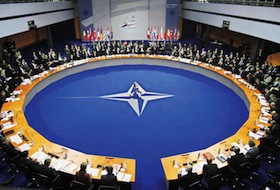Brig. Gen. Adams: Time for Cooperative Missile Defense
July 6, 2011
Featured Image
Time for Cooperative Missile Defense Now - John Adams in The Hill [link]
- Last week we saw Iran’s elite Revolutionary Guards conducted ballistic missile exercises … it demonstrates to all that missiles in the wrong hands threaten our friends and even our homeland.
- Last year, at Lisbon, NATO allies finally embraced missile defense cooperation as an integral part of its strategy. NATO leaders also agreed to extend the area for cooperation to Russia …
- In Washington, however, some continue to use missile defense for narrow, partisan ends. They prey on lingering Cold War fears to score cheap political points at the expense of our national interest and security.
- Now is the time to invest resources and political capital in systems that are flexible and effective … The United States cannot and should not shoulder this burden alone. In this era of tight budget constraints, we need to work with our allies and partners to deploy working, cost-effective defenses.
- ... the view that Russia is the real enemy represents a last-century frame of mind. This is not only unwise, it is dangerous, as it masks the real threats we actually face.
Jeffrey Goldberg and Dan Meridor Push Back Against Critics of Military Option on Iran - Eli Clifton in Think Progress Security [link]
- It’s been nearly two months since former Mossad Chief Meir Dagan declared an Israeli strike on Iran as “the stupidest idea I’ve ever heard,” but backlash ... continues to reverberate in both Israel and the U.S. as journalist Jeffrey Goldberg and Israeli Deputy Prime Minister Dan Meridor launched new attacks on the former intelligence chief.
- Last year, Goldberg, after speaking with 40 current and past Israeli decision makers, observed, “there is a better than 50-percent chance that Israel will launch a strike by next July.” Neither his characterization of a consensus nor his prediction of a military strike have turned out to be accurate.
- The reality is that a majority of living ex-Mossad chiefs are taking sides against the Netanyahu government’s position on Iran ...
Ex-Mossad Chief’s Iran Warnings May Backfire - Jeffrey Goldberg in Bloomberg [link]
- In two recent speeches, [ex-Mossad chief Meir] Dagan called an Iran strike “a stupid idea,”and said “the regional challenge that Israel would face would be impossible.”
- There is much to credit in Dagan’s argument. Iran may be too large a problem for a small state to handle, even a small state with a potent air force. And he is certainly correct to say that Netanyahu and Barak, the only two men with the power to order a strike, are seriously contemplating military action.
- [The perception that Israel could strike Iran] is critical. If Israel does attack the Iranian nuclear program, it will in part be because Dagan undermined his country’s deterrent credibility.
Wishful Thinking - The Will and the Wallet [link]
- The Air Force would like a new bomber, pointing out the bulk of its bomber fleet is B-52Hs, which first entered [service] in 1962. Desiring a new bomber is also not a new state of affairs for the Air Force ... But those plans have not fared well ... For all of these ill-fated programs (B-70, B-1, B-2, and recent attempts to research a new bomber) expansive requirements meant intolerable cost.
- [Secretary of the Air Force Mike Donley said in fall 2009,] “we are also cautious. Cautious not to repeat the painful experience of previous Air Force bomber programs: narrowly focused capabilities, high risk technologies, and high costs contributing to affordability problems, leading to program cancellations, or low inventories.”
- But the Air Force’s talking points ... read like a laundry list of how to make the bomber as expensive as possible.
- Given the history of bombers and our current fiscal constraints, its easy to imagine that not making hard choices now might doom the new bomber program later.
Iran's nuclear steps deepen Western suspicions - Fredrik Dahl in Reuters [link]
- Western analysts see fresh signs that Iran may be seeking to develop the means to build nuclear warheads.
- [Director of the Arms Control Association Daryl] Kimball said Iran was closer to a capability to make atomic weapons but it "apparently has not yet made a strategic decision to do so and is still years, not months, away from building a deliverable nuclear arsenal."
- ... Iran announced last month it would shift its production of higher-grade uranium to an underground bunker and triple output capacity … its refusal to halt enrichment has led to four rounds of U.N. sanctions on the major oil producer, as well as tighter U.S. and European Union restrictions.
- "In spite of economical, technological and political difficulties faced, it appears that Iran is determined to, at the very least, achieve a 'virtual nuclear weapon state' capability," [former chief U.N. nuclear inspector Olli Heinonen] told a U.S. Congress foreign affairs committee.



